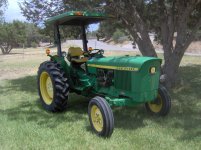GManBart
Elite Member
- Joined
- Dec 10, 2012
- Messages
- 4,967
- Location
- Detroit, Michigan
- Tractor
- Massey Ferguson 241, Kubota SVL90-2
Anecdotally, I found a 2014 Kubota B2650 on craigslist just now, $16,900 with 40 hours on the tractor. Looking on the Kubota website, this tractor new is going to cost about $22,000. That fella paid $2,500/yr or $127.50/hr to use his tractor. If he sells it at the price he wants. So, a napkin calculation tells me a tractor is worth about $1,500/yr to me. If it costs me more than that, I shouldn't buy one. I figure I will use it about 40 hours a year. However, there is no reason for me to spend my maximum cost. Why would I want to spend $18,000 when a $4,000 machine will do all my work for me? And how long can that $18,000 machine maintain its value when a $4,000 machine can do its work? It has to depreciate down to $4,000 eventually, whereas the $4,000 machine could still be worth $4,000 10 years later. Assuming we are comparing apples to apples. Besides the depreciation, its going to come to repairs (there are no 20 year warranties): number of parts in the machine, reliability of the parts, cost of parts, and ability to fix the machine myself (I'm four times cheaper than a mechanic). The 8N wasn't costing me more than a hundred $ in repairs each year. Parts are just cheap.
I'm pretty sure I found that same tractor (2014 Kubota Tractor). There are a couple of things you want to consider before doing the math. First, is that you can normally get somewhere between 10 and 15% off of Kubota online builder prices when you go to make the purchase. That takes the $22K down to as low as $18,700. The tiller is probably worth $1,200 in used, but excellent condition since that brand/size goes for $1,700-1800 new. It's still not an easy decision, but not as clear cut as it might seem.
